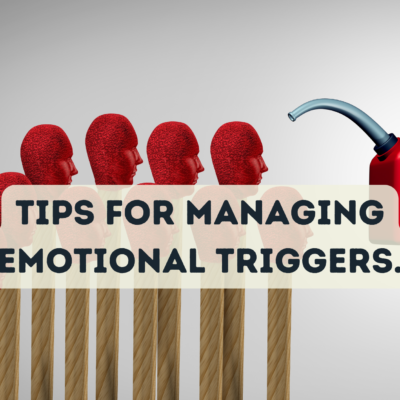Tips for Managing Emotional Triggers: Our life journey is filled with countless experiences, and along the way, we experience emotional triggers that can disturb our inner peace. These triggers are usually rooted in past experiences or unresolved emotions and have the potential to produce intense emotional reactions.
Also Read:
- How to Cope with Unresolved Trauma?
- How to Use an Emotions Wheel for Adults?
- How to Stop Being Jealous of Others Success?
- Strategies for Managing Academic Stress and Mental Health.
- How to Handle The Feeling of Rejection?
Learning to handle these emotional triggers is an important skill for personal growth, improved relationships, and overall well-being. In this article, we will talk about the concept of emotional triggers, understand their origins, and provide a complete guide on how you can effectively handle them.
Understanding Emotional Triggers:
Emotional triggers are reactions that produce strong emotional reactions, which imbalance the present situation. These triggers can be related to past traumas, unresolved issues, or deeply rooted beliefs. By gaining a deeper understanding of emotional triggers, people can proactively handle and control their emotional responses.
Tips for Managing Emotional Triggers:
Identifying Personal Triggers
The first step in handling emotional triggers is to recognize them. Reflect on past experiences that have left a lasting emotional effect and examine situations that constantly produce strong reactions. Common triggers may include criticism, rejection, abandonment, or situations that remind people of past traumas. Journaling and self-reflection can be powerful tools for finding these triggers.
Identifying Physical and Emotional Responses
Emotional triggers are displayed not only in emotional responses but also in physical reactions. Pay attention to your bodily sensations such as increased heart rate, muscle tension, or changes in breathing. These physical signals can act as early warning signs, alerting you to the presence of an emotional trigger. By identifying these responses, one can intervene before emotions get triggered.
Practice Mindfulness and Self-Awareness
Mindfulness is a powerful tool for handling emotional triggers. By developing self-awareness, people can follow their thoughts and emotions without direct judgment. Mindfulness techniques, such as meditation and deep breathing exercises, provide a space for you to pause, recognize your emotions, and respond thoughtfully rather than react impulsively.
Develop Healthy Coping Mechanisms
Replace unhealthy coping mechanisms with positive options. Engage yourself in activities that bring joy, relaxation, and a sense of satisfaction. This might include exercise, creative hobbies, spending time in nature, or staying connected with loved ones. Creating a range of healthy coping mechanisms provides productive outlets for handling emotional triggers.
Create a Support System
Building a strong support system is important for handling emotional triggers. Share your experiences with trusted friends, family members, or a therapist who can offer empathy, understanding, and guidance. Having a support network delivers a safe space to communicate emotions and gain helpful viewpoints on how to handle difficult situations.
Set Boundaries
Setting and maintaining boundaries is important for protecting oneself from possible triggers. Communicate your requirements and limits to others, and be proactive in maintaining boundaries that support your emotional well-being. Setting healthy boundaries promotes a sense of control and empowers you to handle challenging interactions.
Reframe Negative Thought Patterns
Emotional triggers usually arise from negative thought patterns that have developed over time. Challenge and reframe these negative thoughts by adopting a more balanced and realistic outlook. Cognitive-behavioral techniques can be useful in identifying and modifying distorted thought patterns and promoting emotional stability.
Express Vulnerability and Openness
When discussing emotional triggers with others, you should approach the conversation with vulnerability and openness. Share your feelings and experiences, highlighting a desire for understanding instead of blame. This produces an atmosphere of empathy and encourages open communication.
Active Listening
Practice active listening when engaging in conversations about emotional triggers. Give your full attention, avoid interrupting, and reflect on what you have heard to ensure mutual understanding. Active listening encourages empathy and supports the foundation for meaningful communication.
Use “I” Statements
Express your feelings using “I” statements to avoid sounding accusatory or confrontational. For example, say, “I feel overwhelmed when…” instead of “You always make me feel overwhelmed.” This shift in language helps take accountability for your emotions and encourages a collective approach to problem-solving.
Take Breaks When Necessary
Recognize when emotions are rising during a conversation and be willing to take breaks if needed. Temporarily stepping away allows you and the other person to regain peace, preventing further escalation. Establishing a signal or code word for taking breaks can be a valuable communication strategy.
Take Professional Help
If emotional triggers arise from deep-seated traumas or unresolved issues, seeking professional guidance is important. Therapists and counselors can provide specialized support and guide people through the process of healing and growth.
Embrace Continuous Learning
See the journey of handling emotional triggers as a continuous process of learning and self-discovery. Read books, attend workshops, and engage in activities that encourage emotional intelligence and stability. The more knowledge people acquire about themselves and their triggers, the better equipped they become to handle life’s challenges.
Practice Self-Compassion
Develop self-compassion throughout the process of handling emotional triggers. Understand that everyone has vulnerabilities and areas for growth. Treat yourself with empathy and understanding, believing that the journey towards emotional well-being is unique for all of us.
At The End
Handling emotional triggers is a transformative journey that needs self-awareness, resilience, and a commitment to personal growth. By understanding the origins of emotional triggers, developing practical techniques for handling challenging situations, and promoting healthy communication within relationships, you can create a path towards emotional well-being and enduring positive change.








